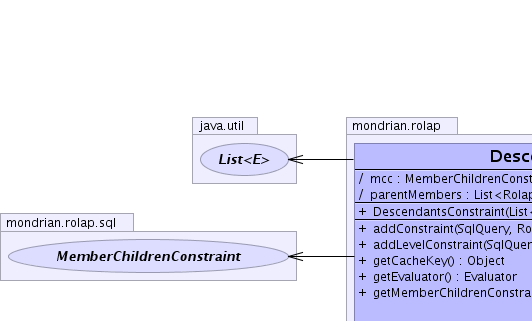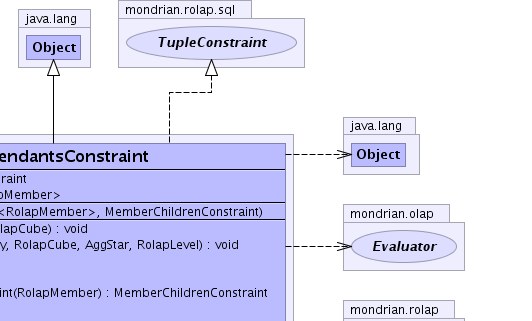 mondrian.rolap.DescendantsConstraint
mondrian.rolap.DescendantsConstraint
|
|||||||||
| PREV CLASS NEXT CLASS | FRAMES NO FRAMES | ||||||||
| SUMMARY: NESTED | FIELD | CONSTR | METHOD | DETAIL: FIELD | CONSTR | METHOD | ||||||||
java.lang.Objectmondrian.rolap.DescendantsConstraint
class DescendantsConstraint
TupleConstaint which restricts the result of a tuple sqlQuery to a set of parents. All parents must belong to the same level.
 |
 |
 |
 |
| Field Summary | |
|---|---|
(package private) MemberChildrenConstraint |
mcc
|
(package private) List<RolapMember> |
parentMembers
|
| Constructor Summary | |
|---|---|
DescendantsConstraint(List<RolapMember> parentMembers,
MemberChildrenConstraint mcc)
Creates a DescendantsConstraint. |
|
| Method Summary | |
|---|---|
void |
addConstraint(SqlQuery sqlQuery,
RolapCube baseCube)
Modifies a Level.Members query. |
void |
addLevelConstraint(SqlQuery sqlQuery,
RolapCube baseCube,
AggStar aggStar,
RolapLevel level)
Will be called multiple times for every "group by" level in Level.Members query, i.e. |
Object |
getCacheKey()
Returns a key that becomes part of the key for caching the result of the SQL query. |
Evaluator |
getEvaluator()
|
MemberChildrenConstraint |
getMemberChildrenConstraint(RolapMember parent)
When the members of a level are fetched, the result is grouped by into parents and their children. |
| Methods inherited from class java.lang.Object |
|---|
clone, equals, finalize, getClass, hashCode, notify, notifyAll, toString, wait, wait, wait |
| Field Detail |
|---|
List<RolapMember> parentMembers
MemberChildrenConstraint mcc
| Constructor Detail |
|---|
public DescendantsConstraint(List<RolapMember> parentMembers,
MemberChildrenConstraint mcc)
parentMembers - list of parents all from the same levelmcc - the constraint that would return the children for each single parent| Method Detail |
|---|
public void addConstraint(SqlQuery sqlQuery,
RolapCube baseCube)
TupleConstraint
addConstraint in interface TupleConstraintsqlQuery - the query to modifybaseCube - base cube for virtual cube constraints
public void addLevelConstraint(SqlQuery sqlQuery,
RolapCube baseCube,
AggStar aggStar,
RolapLevel level)
TupleConstraint
addLevelConstraint in interface TupleConstraintsqlQuery - the query to modifybaseCube - base cube for virtual cube constraintsaggStar - Aggregate table, or null if query is against fact tablelevel - the level which is accessed in the Level.Members querypublic MemberChildrenConstraint getMemberChildrenConstraint(RolapMember parent)
TupleConstraintThe returned MemberChildrenConstraint must be one that would have returned the same children for the given parent as the MemberLevel query has found for that parent.
If null is returned, the parent/children will not be cached (but the level/members still will be).
getMemberChildrenConstraint in interface TupleConstraintpublic Object getCacheKey()
This implementation returns null, because descendants is not cached.
getCacheKey in interface SqlConstraintpublic Evaluator getEvaluator()
getEvaluator in interface TupleConstraint
|
|
||||||||
| PREV CLASS NEXT CLASS | FRAMES NO FRAMES | ||||||||
| SUMMARY: NESTED | FIELD | CONSTR | METHOD | DETAIL: FIELD | CONSTR | METHOD | ||||||||